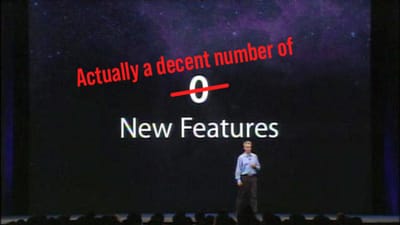Having a Product or Support Mindset About Software
One of my favorite things to post are concepts for how Apple could improve their platforms in the future. Sometimes I'm dangerously close to what they end up doing, and other times I'm off the mark, but I like to do it because it is an extension to what I do at my day job and I simply enjoy it.
Most people receive these well, and either agree or give their own ideas of how to build off my idea, or suggest an alternative way to solve the same problem. These are my people: product people.
Then there is another consortium who I would describe as having more of a "support mindset" when it comes to products. When I suggested a better way to balance complications with using the watch face you want, including why I don't think setting up multiple watch faces was as good a solution, I had a few people say in effect, "just set up the alternate watch faces, it's not that hard." When I suggested Apple tune their JPEG processing from the Camera app to be more in line with how I edited previous photos, I got suggestions for setting up a preset in Lightroom or a Shortcut to do this manually. This to me is a more support-oriented mindset.
I call this "support oriented" because when you work in support, your job is to try and get people what they want with whatever is currently available. "This is a workaround, but it could get the job done…" is a common saying from support staff, and is one I used constantly when I worked in tech support in my previous job.
But being "product oriented" to me means focusing on existing problems, considering the current workarounds for them, and coming up with an elegant solution that solves the problem delightfully for the user. After all, we don't use Apple products because we can workaround our way to the features we want, we use them because they are chock full of features that make doing what we need a joy.
Consider this: let's pretend iMessage was a Mac-only feature, and I wanted to send and sync messages from my iPhone and iPad. The support oriented answer would be something like:
First, you need to download this kernal extension for the Mac that scrapes your iMessages from the app on your Mac. Then you need to keep the Messages app open 24/7 and make sure your Mac never goes to sleep. This extension has a companion app for the iPhone and iPad that you can install from Cydia that checks your Mac's iMessages and pulls them over to your iOS devices. You don't get all of the iMessage features, but you can at least send and receive texts.
The product oriented answer would be:
Apple should make iMessage for iOS and integrate it into the Messages app so I can seamlessly use it with all of my other text messaging.
The advantage of the support mindset is that it can sometimes solve your problem right away, but the downsides are that it is often not elegant, may be fragile and prone to breaking with software updates, and requires a walkthrough to set up.
Meanwhile, the advantage of the product mindset is that it typically results in a more elegant solution and offers fewer compromises. The downside is that if you don't work for the company who's problem you're trying to solve, it won't deliver any immediate solutions to your problem, you're mostly hoping that someone from said company gets wind of your idea and uses it to inspire real change.
Takeaway
I think it's healthy to have a combination of these mindsets. I lean more towards the product side because I want the things I use to be as great as humanly possible, and I enjoy thinking of how things could be in the future.
But it's also good to consider the support mindset because you can't look at every problem, throw your hands in the air, and say "I can't do it perfectly, so I'm just going to live with this problem until they make it better." Not everything deserves a bunch of time invested to make it perfect, and figuring out what is worth the investment and what is not worth it is the entire job of product organizations.


